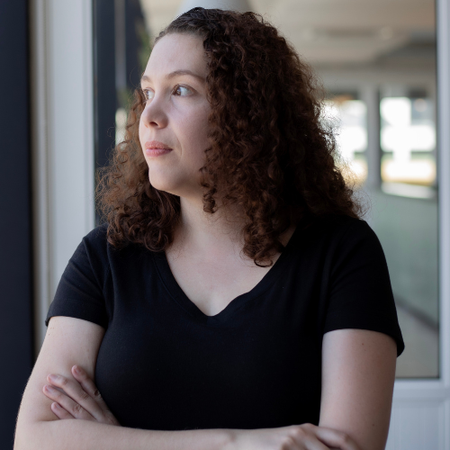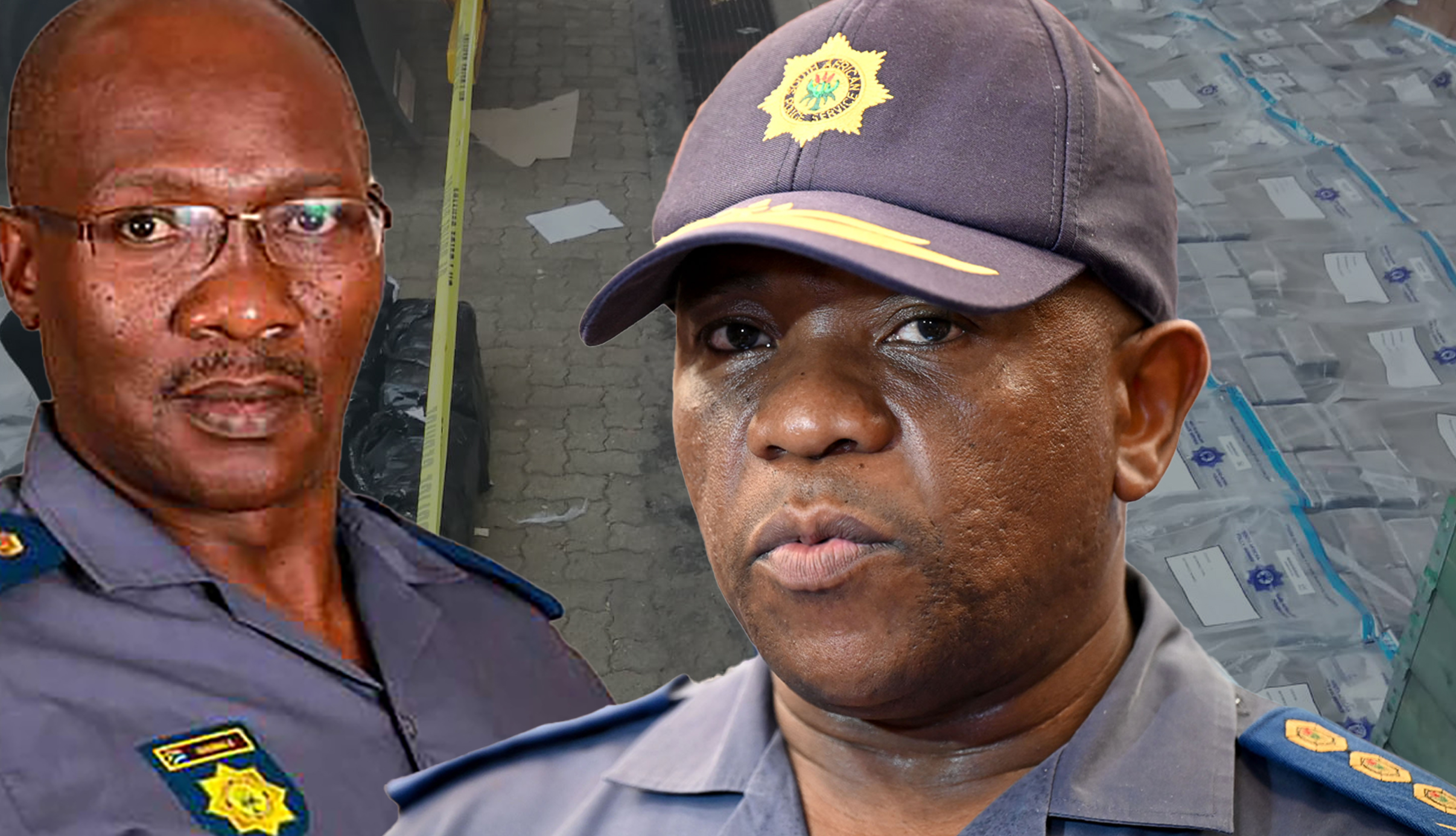At the centre of a seismic battle that is further fragmenting South Africa’s fraught policing arena are accusations that have cropped up before – that some of the country’s law enforcers are in cahoots with top-tier criminals, ranging from assassins to international drug traffickers.
On Sunday, 6 July 2025, KwaZulu-Natal Police Commissioner Lieutenant General Nhlanhla Mkhwanazi held a press conference during which he made several astounding accusations about fellow officers and Police Minister Senzo Mchunu.
Mkhwanazi’s main accusations about Mchunu were that at the end of last year, he issued a directive to disband the Political Killings Task Team, set up in 2018, to shield politically connected members of a criminal syndicate from prosecution.
/file/dailymaverick/wp-content/uploads/2025/07/ED_560828.jpg)
Mchunu hit back, labelling Mkhwanazi’s accusations “wild allegations and claims”.
‘The war we’re facing’
Mkhwanazi has effectively alleged that there is a high-level criminal syndicate operating in this country and that it extends into the South African Police Service (SAPS), the Police Ministry, Parliament, official prison structures, the judiciary and other law-enforcing authorities.
He also referred to alleged dodginess linked to the National Prosecuting Authority’s (NPA) corruption-busting team and inferred that the country’s critical Crime Intelligence unit may have been intentionally imploded.
/file/dailymaverick/wp-content/uploads/2024/09/ED_508026.jpg)
If there is truth in the inferences, the reasons would be so that certain criminals can continue operating or even gain control of the unit and the sensitive information it holds.
While some sources close to policing have brushed off Mkhwanazi’s accusations as irresponsible and nonsense, others believe he has exposed the real problems tripping up policing in South Africa.
On Monday, in apparent response to all that Mkhwanazi outlined, National Police Commissioner Fannie Masemola tried reassuring the public that policing at an operational level was on track.
President Ramaphosa, meanwhile, referred to the developing scandal as a “grave national security concern”.
Various politicians have also spoken out about it.
During his press conference, Mkhwanazi wore Special Task Force camouflage – he was previously the head of the unit – and was surrounded by armed police officers.
He said, “The war that we’re facing, it’s so serious that it deals with high-level senior officers within the criminal justice system. Therefore, it is important for us to go into a combat mode.
“It is important for me to make sure that I take on the enemy directly.”
The key allegations Mkhwanazi made revolve around deep-rooted state corruption, cover-ups and dirty tricks – similar to what unfolded when South Africa was in the grip of State Capture when Jacob Zuma was president between 2009 and 2018.
What Mkhwanazi detailed on Sunday has not been tested in court or officially or fully corroborated.
But what makes some of his accusations especially worrying is that related suspicions have surfaced before, and other state scandals are key nodes that connect them.
‘The drug cartel’
Daily Maverick has reported extensively on international drug trafficking in and via South Africa and how there are suspicions that corrupt state figures, including police officers, work with other criminals to move around narco consignments.
This journalist’s book, Clash of the Cartels: Unmasking the global drug kingpins stalking South Africa, also explores suspected and state links to trafficking over decades.
Daily Maverick has before detailed how cocaine from Brazil was being pumped into South Africa, mainly via Durban harbour, and how a few years ago the Hawks stated: “Police officers have previously been arrested in cocaine interceptions, particularly related to Durban.
“[A] special task team has been assigned to conduct investigations which are ongoing and still sensitive.”
Read more: Blood ties: South Africa caught in a web of murderous, drug-smuggling Brazilian gangs
Officers from Johannesburg’s Metropolitan Police Department were among those who were the focus of drug trafficking investigations.
On Sunday, when addressing the media, Mkhwanazi shared a presentation outlining various allegations, including some tied to drugs.
The presentation said police officers from KwaZulu-Natal had been deployed to support the Gauteng Organised Crime Investigation Unit.
It added: “This investigation has unmasked the syndicate which involves politicians, law enforcement (SAPS, Metro Police & Correctional Services), prosecutors, judiciary and controlled by [a] drug cartel as well as business people.”
Mkhwanazi elaborated: “This drug cartel… that’s operating in Gauteng as a headquarters, [is] importing these drugs from abroad,” he said on Sunday.
Drugs were allegedly being brought in from South America and often entered South Africa via the Port of Durban in KwaZulu-Natal – the province where Mkhwanazi heads the police.
The drugs were subsequently smuggled from KwaZulu-Natal to Gauteng to be processed. Mkhwanazi said that “from there they distribute this drug all over, in the country as well as other countries.”
The R200m cocaine case
Roughly corroborating what Mkhwanazi said was revealed in a 2021 R200-million cocaine crackdown in Johannesburg.
Daily Maverick previously reported that the cocaine was from Brazil.
Once in South Africa it was, according to police, transported from KwaZulu-Natal to Gauteng. (This matches what Mkhwanazi alleged on Sunday in terms of the “drug cartel” with state links.)
The 2021 cocaine interception in Johannesburg involved the arrests of police officers.
This is also where Major General Feroz Khan, the head of counterintelligence and security at Crime Intelligence, fits in, as well as his boss who headed Crime Intelligence nationally, Dumisani Khumalo.
Khan had been accused of defeating the ends of justice and bringing the SAPS into disrepute concerning his presence at the 2021 interception.
But Khan, via court process, had countered that Khumalo had used the cocaine interception to try to get rid of him because of his investigations, with possible links to Khumalo, into the abuse of secret service funds.
Police bosses denied that Khan was being dubiously targeted.
Earlier this year, the NPA confirmed to Daily Maverick that the 2021 cocaine interception, previously the focus of a withdrawn court case, had not yet concluded.
This means that previously implicated police officers may not be totally off the hook.
Khumalo’s arrest and ‘classified documents’
The 2021 cocaine interception was among the controversies attached to Khumalo, who was arrested late last month, along with six colleagues, in connection with an allegedly irregular appointment.
They have denied the accusations against them.
Last week, Daily Maverick reported that about four months before the arrests, the SAPS had warned that Khumalo was being targeted for cleaning up the Crime Intelligence unit.
According to SAPS, the targeting had involved “fake news” and accusations that he was appointing people aligned with him.
This is what he was arrested for in June – an allegedly irregular appointment.
News24 reported that allegations of wrongdoing relating to Crime Intelligence had been formally lodged with police by individuals including Fadiel Adams, a member of Parliament (MP) representing the National Coloured Congress.
During Parliamentary police committee meetings, he has been outspoken about matters including Crime Intelligence.
Mkhwanazi, during his press conference on Sunday, added to the Crime Intelligence and Khumalo arrest controversy.
He alleged that in the runup to Khumalo’s detention, “members of Crime Intelligence released classified documents and handed them over to a member of Parliament”. (He did not name the MP.)
Mkhwanazi said the “classified documents” related to issues including vetting as well as covert properties.
The ex-cop and corruption investigators
He said the MP subsequently registered a criminal case in Gauteng and that Police Minister Mchunu was allegedly approached and asked, “to take these dockets and assign them to someone else”.
Mkhwanazi alleged that Mchunu’s chief of staff wrote to the Investigating Directorate Against Corruption (Idac), which falls under the NPA, asking that the cases of Crime Intelligence vetting process manipulation be investigated.
While that specific aspect relating to Mchunu is unconfirmed, the Idac did indeed arrest Khumalo and his six colleagues.
During Sunday’s press conference, Mkhwanazi claimed that the Idac “investigating officer” apparently overseeing the case was a retired policeman – a former member of Crime Intelligence.
Mkhwanazi said this ex-Crime Intelligence officer was not qualified for the Idac role and had “no investigative experience at all”.
When Khumalo and five of his six co-accused were granted bail the day after their arrests, one of the bail conditions was that they may not go near any Crime Intelligence building in the country.
Instead, they were told the Idac “investigating officer” would access whatever they needed from there.
Mkhwanazi said on Sunday that this gave the Idac officer “carte blanche” to access anything at Crime Intelligence on behalf of the accused.
On Monday, 7 July 2025, Daily Maverick asked Idac spokesperson Henry Mamothame for a response to Mkhwanazi’s allegations.
Mamothame said: “We are not commenting on the media briefing, but we will respond at an appropriate time.”
Crime Intelligence and ‘coup’ optics
What Mkhwanazi alleged, that classified documents were leaked from Crime Intelligence in the runup to Khumalo’s arrest – and were used to lodge a criminal case against him – suggests that some of Khumalo’s colleagues in his unit, for whatever reason, wanted him detained.
Among his six co-accused is the section head of personnel vetting, Brigadier Phindile Ncube.
The Crime Intelligence arrests, therefore, directly affect the unit’s vetting section.
On Sunday, referring to this arena, Mkhwanazi said: “The vetting section within Crime Intelligence has more powers than any other units within that space because they can scrutinise everything about an applicant who is applying for security clearance, and they can manipulate that security clearance process for their own benefit.”
Mkhwanazi also alleged that on 31 December last year, Police Minister Mchunu had issued a letter suspending the filling of Crime Intelligence vacancies.
The result was that KwaZulu-Natal had no provincial Crime Intelligence head.
“In this province, we are trying to figure out on our own how to infiltrate syndicates because the minister decided these posts must not be filled,” Mkhwanazi said.
Regardless of the veracity of Mkhwanazi’s accusations, if KwaZulu-Natal does not have a Crime Intelligence head, it means that the province, to where international drug cartels are known to ship masses of drugs and where alleged police involvement in trafficking is linked to, is lacking this crucial leadership.
A province where global organised crime connects to South Africa is therefore exposed via a policing gap.
Various other figures fit into this overall scandal.
Among them is forensic investigator Paul O’Sullivan who was involved in opening dockets against Crime Intelligence and was pushing for the suspensions of the officers who were arrested last month.
He told Newzroom Afrika on Sunday, after Mkhwanazi’s press conference, that some of the allegations Mkhwanazi made were false.
O’Sullivan also said Mkhwanazi’s appearance during the briefing – in camouflage along with similarly dressed armed officers – made it look “like he’s threatening a coup”.
During the press briefing, Mkhwanazi had referred to a publicised call for the suspensions of Khumalo and the other six arrested Crime Intelligence officers.
He did not indicate who the call emanated from. (O’Sullivan, meanwhile, is on record as calling for the suspensions.)
Of this, Mkhwanazi alleged: “It’s a call that is putting more pressure to make sure that the Crime Intelligence is handed over to the criminal syndicate.
“That’s what it’s about.”
This week, the SAPS is expected to announce who will fill the position of Crime Intelligence head after Khumalo’s arrest.
The appointment may shed some light on the multiple claims and counterclaims clouding the country’s law enforcement arena. DM





 Illustrative image, from left: Arrested SA Crime Intelligence boss Lieutenant General Dumisani Khumalo. (Photo: SAPS Facebook) | Police Commissioner of KwaZulu-Natal Lieutenant General Nhlanhla Mkhwanazi. (Photo: Gallo Images / Beeld / Deaan Vivier)
Illustrative image, from left: Arrested SA Crime Intelligence boss Lieutenant General Dumisani Khumalo. (Photo: SAPS Facebook) | Police Commissioner of KwaZulu-Natal Lieutenant General Nhlanhla Mkhwanazi. (Photo: Gallo Images / Beeld / Deaan Vivier)